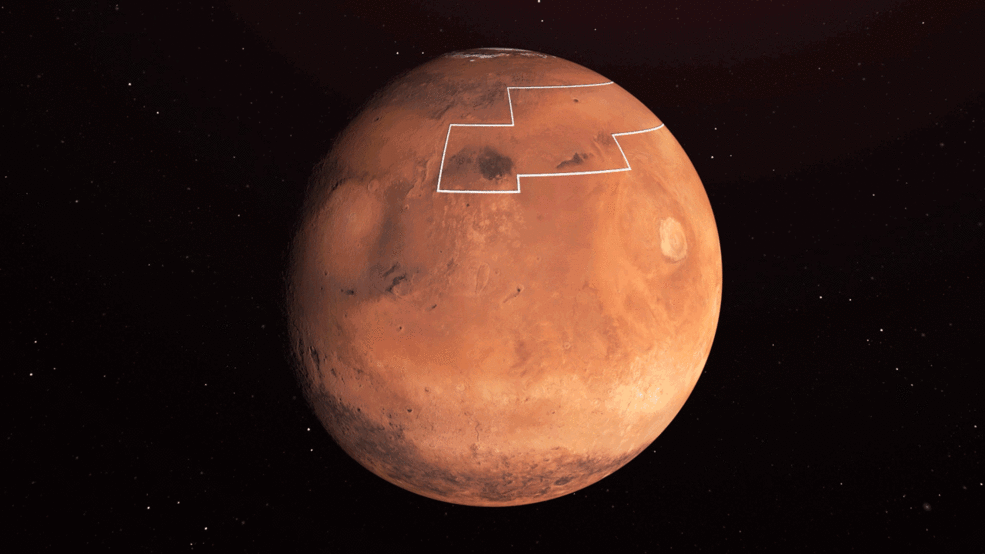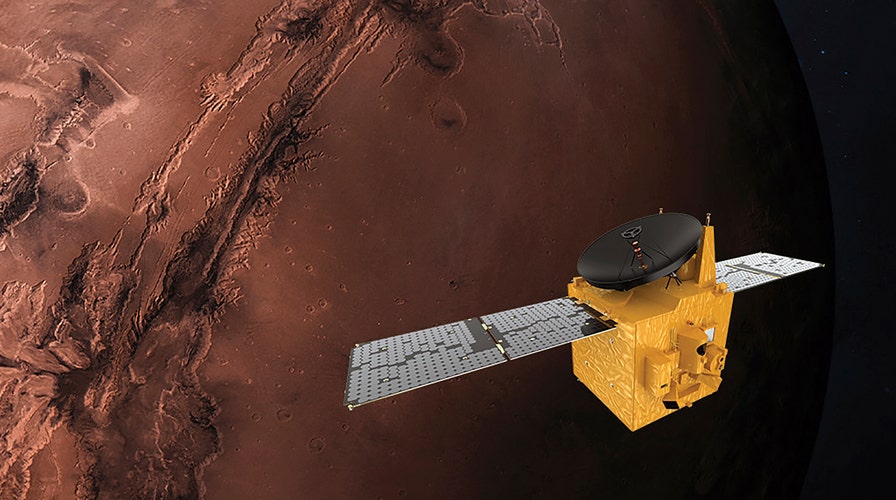Fox News Flash top headlines for September 28
Fox News Flash top headlines are here. Check out what's clicking on Foxnews.com.
Mars has an abundance of liquid water in the underground lakes in its south pole, according to a newly published study.
The research, published in Nature Astronomy, found three lakes at Ultimi Scopuli, near Mars' south pole, that the scientists believe to be filled with brine or saltwater.
"Not only have we confirmed the position, extent and intensity of the reflector identified in our 2018 study," study co-author Elena Pettinelli said in a translated statement, adding "but we also found three new highly reflective areas."

The annotated area in this illustration shows where water ice is located near the surface of Mars. (Credits: NASA/JPL-Caltech)
In 2018, scientists made the incredible discovery of a "stable body of liquid water" on Mars. The three lakes are roughly 6 miles across, nearly a mile deep and approximately 12 miles away from the lake discovered in 2018.
"Our results strengthen the claim of the detection of a liquid water body at Ultimi Scopuli and indicate the presence of other wet areas nearby," the researchers wrote in the study's abstract. "We suggest that the waters are hypersaline perchlorate brines, known to form at Martian polar regions and thought to survive for an extended period of time on a geological scale at below-eutectic temperatures."
Pettinelli and the other scientists on the study looked at the radar data from MARSIS (Mars Advanced Radar for Subsurface and Ionosphere Sounding), described by NASA as a "subsurface radar sounder with a 40-meter (130-foot) antenna on the Mars Express orbiter."
The lakes have the potential to be home to microbial life, which has been known to exist in the frost in extreme conditions.
“While the existence of a single subglacial lake could be attributed to exceptional conditions such as the presence of a volcano under the ice sheet, the discovery of an entire lake system implies that their formation process is relatively simple and common, and that these lakes have likely existed for much of Mars' history," study co-author and Principal Investigator of the MARSIS experiment Roberto Orosei added in the statement. "For this reason, they could still retain traces of any life forms that could have evolved when Mars had a dense atmosphere, a milder climate and the presence of liquid water on the surface, similar to the early Earth."
MASSIVE LAVA TUBES ON MARS AND THE MOON COULD BE HOME TO LIFE, RESEARCHERS FIND
It's unclear if the 2018 discovery is related to the current discovery, but it may be a sign there is more water to discover, explained Enrico Flamini, president of the International Research School of Planetary Sciences at the University of Chieti-Pescara, who was not involved in the study.
"To say that these new results make me happy is not enough," Flamini said in the statement. "The only real question still open after our first job was: is this the only proof of liquid water under ice? At the time we had no data to say more, now this new research shows that the 2018 discovery was just the first evidence of a much larger system of liquid water bodies in the Martian subsoil. That's exactly what I would have hoped for: a great result, really!"
In April 2019, a separate group of researchers suggested the water thought to be responsible for dark streaks on the Red Planet may be coming from well below the surface.
NASA THINKS ALIEN LIFE MIGHT BE HIDING UNDERGROUND IN ANCIENT CAVES ON MARS
A separate group of researchers suggested in January 2020 that the water on Mars once contained the right ingredients to support life.
In March, other researchers discovered the presence of organic molecules that are "consistent with ... life."
NASA recently launched the Perseverance rover into space to explore Mars. While on the Red Planet, the rover will perform a variety of different functions, including looking for evidence of ancient life.









































